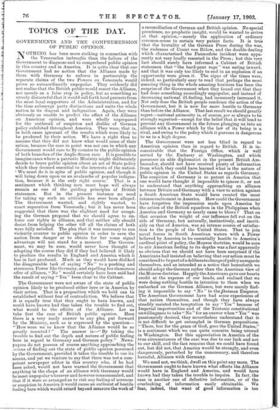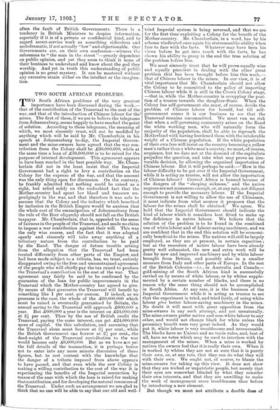TOPICS OF THE DAY.
GOVERNMENTS AND THE COMPREHENSION OF PUBLIC OPINION.
The Government were not aware of the state of public opinion likely to be produced either here or in America by their action. That is a proposition which we hold can be established without fear of contradiction. We believe that it is equally true that they ought to have known, and could have known had they taken the trouble to find out, what would be the effects of the Alliance. Let us take first the case of British public opinion. Here there is a very ready answer to any plea put forward by the Ministry, such as is expressed by the question- " How were we to know that the Alliance would be so greatly resented ? " The answer is—"By taking the trouble to find out the depth and nature of public feeling here in regard to Germany and German policy." News- papers do not possess of course anything approaching the means of finding out the state of public opinion possessed by the Government, provided it takes the trouble to use its means, and yet we venture to say that there was not a com- petent newspaper editor in this country who, if he had been asked, would not have warned the Government that anything in the shape of an alliance with Germany would be most unpopular wherever and however consummated, and that if it were so arranged as to risk any feeling of soreness or suspicion in America it would cause an outburst of hostile feeling here which would retard beyond measure the work of NOTHING has been more striking in connection with the Venezuelan imbroglio than the failure of the Government to diagnose and to comprehend public opinion in this country and in America. It is quite clear that our Government had no notion that the Alliance made by them with Germany to enforce in partnership the separate claims of the two Powers on Venezuela would prove so extraordinarily unpopular. They evidently did not realise that the British public would resent the Alliance, not merely as a false step in policy, but as something so utterly distasteful that it would call forth loud protests from the most loyal supporters of the Administration, and for the time submerge party distinctions and unite the whole nation in its disgust and indignation. Again, they were obviously as unable to predict the effect of the Alliance on American opinion, and were wholly unprepared for the outbreak of suspicion and dislike of German policy exhibited throughout America. They were, that is, in both cases ignorant of the results which were likely to be produced by their action. We have a right thus to assume that they did not know what would come of their action, because the case in point was not one in which any Government would care to fly counter to the public opinion of both branches of the Anglo-Saxon race. It is possible to imagine cases where a patriotic Ministry might deliberately decide to brave public opinion about an act of State policy which they deemed essential to the interests of the nation. 'We must do it in spite of public opinion, and though it will bring down upon us an avalanche of popular indigna- tion, because it is the only right course. That is a sentiment which thinking men must hope will always remain as one of the guiding principles of British statesmen. But in the present instance no need for taking up such an attitude has ever been alleged. The Government wanted, and rightly wanted, to exact reparation from Venezuela ; but it has never been suggested that there was the slightest need for accept- ing the German proposal that we should agree to en- force our rights m alliance, and that neither ally should desist from helping the other till all the claims of both were fully satisfied. The plea that it was necessary to run violently counter to public opinion in order to save the nation from danger or to obtain for her some signal advantage will not stand for a moment. The Govern- ment, we may be sure, would never have thought of adopting the course they did if they had believed it likely to produce the results in England and America which it has in fact produced. Much as they would have disliked the disagreeable task of saying " No " to a pushing and strenuous Power like Germany, and repelling her clamorous offer of alliance, " No " would certainly have been said had the result of saying " Yes " been clear to the Cabinet. a reconciliation of German and British opinion. No special prescience, no prophetic insight, would be wanted to arrive at that opinion,—merely the application of ordinary common-sense to certain very patent facts. It is true that the brutality of the German Press during the war, the rudeness of Count von Billow, and the double-dealing which characterised the Pauncefote incident were appa- rently not very loudly resented in the Press ; but this very fact should surely have informed a Cabinet of British statesmen that "the hard-pent rage" was eating inward, and that it was only too likely to end in an explosion if an opportunity were given it. The signs of the times were, indeed, so particularly easy to read that perhaps the most amazing thing in the whole amazing business has been the surprise of the Government when they found out that they had done something exceedingly unpopular, and instead of decreasing national ill-feeling, had immensely increased it. Not only does the British people condemn the action of the Government, but it is now far more hostile to Germany than before the Alliance. That last result we should greatly regret—national animosity is, of course, per se always to be strongly regretted—except for the belief that it will tend to prevent any Government in the future plunging us into an alliance with a Power which by the law of its being is a rival, and owing to the policy which it pursues is dangerous to us in a high degree.
The Government were not less blind in regard to American opinion than in regard to British. It is in- conceivable that the Foreign Office, which is well served by the Embassy at Washington, and which possesses an able diplomatist in the present British Am- bassador, should not have received plenty of information from which they could have learned what is the nature of public opinion in the -United States as regards Germany. The suspicion of Germany is so patent in America that one would have thought it impossible to ignore it, or not to understand that anything approaching an alliance between Britain and Germany with a view to action against a South American State would have created the most intense excitement in America. How could the Government have forgotten the impression made upon America by the action of the British squadron in the Philippines when America and. Germany so nearly came to blows ? That on that occasion the weight of our influence fell rot on the side of Germany, but naturally, instinctively, and inevit- ably on that of America, was an intense source of satisfac- tion to the people of the United States. That to join naval forces in South American waters with a Power believed by America to be essentially hostile to America's cardinal point of policy, the Monroe doctrine, would be sure to stir American feeling to its depths was a fact apparently so obvious that we should not have been surprised if the Americans had insisted on believing that our action must be considered to bepartof a deliberate change of policy as regards themselves, and as intended as a notice that henceforth we should adopt the German rather than the American view of theMonroe doctrine. Happily the Americans gave our hearts credit at the expense of our heads, and realised that we were doing nothing hostile in intention to them when we embarked on the German Alliance, but were merely find- ing it impossible to say " No " to the Ferman Emperor. The American Government have had some experiences of that nation themselves, and though they have always steadily resisted the temptation to say " Yes " because of Imperial importunities and of the Teutonic constitutional unwillingness to take "No "for an answer when " Yes" was passionately desired, they nevertheless understand that it is not difficult to get entangled in German propositions. "There, but for the grace of God, goes the United States," is a sentiment which we can quite conceive being uttered in Washington. But this appreciation in America of the true circumstances of the case was due to our luck and not to our skill, and the fact remains that we could have found out, but did not, that America would be strongly, and even dangerously, perturbed by the unnecessary, and therefore harmful, Alliance with Germany.
We need not, we think, dwell on this point any more. The Government ought to have known what effects the Alliance would have in England and America, and would have known had they taken the trouble to inquire. In fact, the case is another one of defective information, or of the overlooking of information easily obtainable. We fear, indeed, that want of good information is too often the fault of British Governments. There is a tendency in British Ministers to despise information, especially if it is of a private or confidential kind, and to regard secret-service work as something ridiculous and melodramatic, if not actually "low" and objectionable. Our Governments are, on their own confession—witness the references to "the man in the street "—greatly dependent on public opinion, and yet they seem to think it none of their business to understand and know about the god they worship. And yet in truth this understanding of public opinion is no great mystery. It can be mastered without any excessive strain either on the intellect or the imagina- tion.











































 Previous page
Previous page